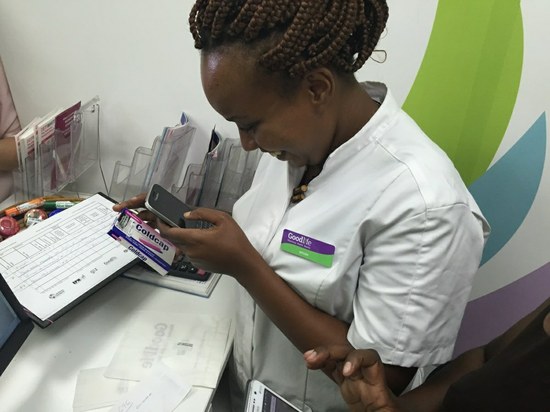Contribution to MMI Annual Report 2015
Counterfeit drugs represent a major health risk for the public health and the individual patient. They lower the confidence in medicines, harm the manufacturers, the importers and the whole health system in the affected country. With the project REAL (Rapid Electronic Authenticity Labels) action medeor e.V. developed an efficient, cheap and user-friendly verification system for medicines based on a label with a unique hidden code that can be checked via internet database. The pharmaceutical personnel as well as the buyer are enabled to ensure the authenticity of the purchased product with the help of a smartphone or a computer with internet access. The REAL scratch-off labeling is being tested until May 2016.
Counterfeit medicines may contain no active ingredient, the wrong active ingredient or the wrong amount of the correct active ingredient. They often are produced in very poor and unhygienic conditions by unqualified personnel. Contamination with bacteria or unknown impurities or fatal levels of the active ingredient might cause very serious damages to the health of the consumer.
While counterfeiting is primarily motivated by its potentially huge profits, it benefits from a lack of efficient national drug regulations, deficient supervising authorities and weak penal sanctions and a lack of efficient national drug regulation in some countries.There are counterfeit medicine cases in every part of the world. In some countries trade in counterfeit medicines is more profitable than dealing with drugs or weapons.
Patients lose their confidence in medicines
The visual detection of substandard and counterfeit drugs is difficult because they are usually designed to appear identical to the genuine product. The falsified medicines may not necessarily cause an adverse reaction but often they fail to properly treat the disease or the condition for which they were intended. Hence the people do not find out that the drugs they were taking were counterfeit and lose their confidence in medicines.
Apart from the direct impact on individuals, counterfeit drugs can cause resistance to medicines especially antibiotics or antiviral drugs. Malaria is a prime example, where Artemisinin and its derivatives already show resistance rates of over 70%. Antimicrobial resistance has become a huge threat to public health.
Providing high quality medicines with ensured authenticity
The challenge for action medeor, acting as a wholesaler and involved in the distribution of drugs, is not only to provide high quality medicines but also to provide information about the authenticity of the delivered goods. Therefore action medeor wanted to set up a verification system for pharmaceutical personnel and patients to ensure them the authenticity of their medicine. The system should be portable to different settings, open for various manufacturers and markets. The “scratch-off technology” seemed to be a good solution because of the high consumer acceptance for other goods in this technology in developing countries, especially in mobile phone services.
The label which is applied to the medicine packaging at the manufacturing site consists of a not covered serial number and a covered unique code. After scratching the metallic covering off, the unique code will be revealed and the product can be verified by using a smartphone, tablet or a computer with internet access. Using a smartphone, a QR code reader app can read the QR code and takes the user directly to the website where the code will be justified against a database. Within seconds the end-user receives a response whether the two numbers are matching and hence he has an original product in his hands. A picture of the medicine packaging and the package insert are also available. If the numbers are not matching or the numbers have been requested before, the consumer will be warned.
Trial phase in Kenya just started
After the development and testing of the authenticity tool by action medeor in Germany in January and February, the scratch-off labels were provided to the pharmaceutical manufacturer REGAL Pharmaceuticals in Kenya. REGAL Pharmaceuticals experienced that one of their products, Coldcap, a common cold remedy, had been falsified earlier. Thus a test product was found. Coldcap was labelled and distributed for free to 12 branches belonging to the pharmacy chain Goodlife. The pharmacists and the sales staff were trained by Dr. Irmgard Buchkremer, a pharmacist, Margret Müller, project coordinator from action medeor Germany and pharmacist and program officer Susanne Kuehle from EPN (Kenya). The pharmacists of the 12 chosen Goodlife branches are now able to advise the costumers and give them instructions for the appropriate verification of the product they purchased. In addition, the branch managers of the involved pharmacy branches were trained at their monthly meeting. Local contact point and coordination partner in Kenya is Ecumenical Pharmaceutical Network, in particular Susanne Kuehle. EPN office is in contact with the pharmacy chain management and the pharmaceutical personnel of the branches. EPN is also ready to answer questions from buyers, in case of problems with the technology or they receive a warning from the system.
The trial phase in Kenya will continue until the end of April 2016. There is a great deal of interest in the project from different stakeholders like the supervising authority in Kenya, PPB, technology companies and pharmaceutical manufacturers. However, a careful evaluation of the acquired data is necessary and the results are to be considered carefully before deciding whether to prolong of the project in Kenya or to expand to other African countries.
- A report by Irmgard Buchkremer (action medeor e.V.) and Susanne Kühle (EPN)
- Project page: https://portal.medeor.de/validate
- Project partners: www.medeor.de, www.epnetwork.org
Contribution by EPN and action medeor to the Annual Report 2015 of the MMI Network

